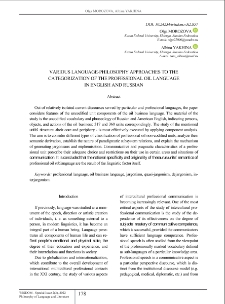Object
Title: Various Language-Philosophy Approaches to the Categorization of the Professional Oil Language in English and Russian
Journal or Publication Title:
Date of publication:
Volume:
Number:
ISSN:
Corporate Creators:
Խ․ Աբովյանի անվան հայկական պետական մանկավարժական համալսարան
Coverage:
Abstract:
Out of relatively isolated current discourses served by particular and professional languages, the paper considers features of the uncodified unit components of the oil business language. The material of the study is the uncodified vocabulary and phraseology of Russian and American English, indicating persons, objects, and actions of the oil business: 317 and 360 units correspondingly. The study of the mentioned units‟ structure -their core and periphery -is most effectively executed by applying component analysis. The aim is to consider different types of classification of professional oil non-codified units, analyze their semantic derivation, establish the nature of paradigmatic subsystem relations, and explain the mechanism of generating jargonisms and euphemisation. Communicative and pragmatic characteristics of a profes-sional unit prescribe their adequate choice and restrictions on their use in certain areas and situations of communication. It is concluded that the national specificity and originality of thesaurus units‟ semantics of professional oil sublanguage are the result of the linguistic factor itself.
Place of publishing:
Երևան
Publisher:
Format:
Identifier:
oai:arar.sci.am:372094
Language:
Object collections:
Last modified:
Oct 8, 2025
In our library since:
Apr 1, 2024
Number of object content hits:
83
All available object's versions:
https://arar.sci.am/publication/401961
Show description in RDF format:
Show description in OAI-PMH format:
-
Իմաստություն=Wisdom=Мудрость
-
Իմաստություն, 2013, N 1
-
Իմաստություն, 2014, N 1 (2)
-
Իմաստություն, 2014, N 2 (3)
-
Իմաստություն, 2015, N 1 (4)
-
Wisdom, 2015, N 2 (5)
-
Wisdom, 2016, N 1 (6)
-
Wisdom, 2016, N 2 (7)
-
Wisdom, 2017, N 1 (8)
-
Wisdom, 2017, N 2 (9)
-
Wisdom, 2018, N 1 (10)
-
Wisdom, 2018, N 2 (11)
-
Wisdom, 2019, N 1 (12)
-
Wisdom, 2019, N 2 (13)
-
Wisdom, 2020, N 1 (14)
-
Wisdom, 2020, N 2 (15)
-
Wisdom, 2020, N 3 (16)
-
Wisdom, 2021, N 1 (17)
-
Wisdom, 2021, N 1 (1) Special issue
-
Wisdom, 2021, N 2 (18)
-
Wisdom, 2021, N 3 (19)
-
Wisdom, 2021, N 4 (20)
-
Wisdom, 2022, N 1 (21)
-
Wisdom, 2022, N 1 (2) Special issue
-
Wisdom, 2022, N 2 (22)
-
Wisdom, 2022, N 2 (3) Special issue
- Editorial board
- Contents
- Editor`s Foreword
- New Nakhichevan Dialect as an Element of the Armenian National Identity
- Philosophy of Dramatisation in the Context of Art Interaction in W. S. Maugham’s Novels
- Modern Ukrainian Grand Narrative: Prospects for Evolution
- Hate Language Produced by Indonesian Figures in Social Media: From Philosophical Perspectives
- Existential-Ontological Manifestations of Time in Khrimian Hayrik’s Essay “Time and Its Essence”
- Philosophical and Discursive Approaches to the Categorisation of Modal Meanings in Multimodal Texts
- The Novels by T. Hardy “Tess of the D’urbervilles” and “Loose” by Panas Myrnyi: Peculiarities of Stylistic Narration
- Problems of Studying the Verbal Semantics of Differential Languages in the Conditions of Bilingualism
- Philosophical Conception of Stable Verse Forms (Based on Yeghishe Charents’s Poetry Analysis)
- Synergetic Concepts “Chaos” and “Order” in Modern English Verbo-Creating Processes
- Paradigm of the Competence of Linguists in the Education System in the Context of Understanding the Philosophy of Language
- Nikolay Gogol and Raphael Patkanyan: The Philosophy of Horror
- Speech Aggression in Corporate Communication: The Gender Aspect in the Philosophy of Culture
- Camus’ Understanding of the Paradoxically Multidimensional Human Being
- US Presidents’ Political Speeches as a Means of Manipulation in 21st Century Society
- Provocation as a Tool of Language Influence
- Promise: Semantic, Communicative and Temporal Aspects
- Various Language-Philosophy Approaches to the Categorization of the Professional Oil Language in English and Russian
- The Role of Personality Type and Self-Determination of Students Majoring in Non-Philological Specialities While Building English for Professional Purposes Competence
- English Biblicisms in Colloquial Speech and a Literary Text: Looking for the Right Interpretation
- Philosophical and Ethical Problems of the Category “Life” in Michael Kozoris’s Novella “Chornohora Speaks”
- The Folk Medicine Concept in Vernacular English of the XIX Century
- Language-Philosophy Anomalies in the Framework of Free Indirect Speech: By the Example of Marina Tsvetaeva’s Prose
- Exploring the Origin of the Present-Day Human Self on the Fringes of Linguistic Advancement
- Perception of José Ortega y Gasset’s Works in Essays of Oksana Zabuzhko
- English Occult Discourse as a Cultural Phenomenon
-
Wisdom, 2022, N 3 (23)
-
Wisdom, 2022, N 3 (4) Special issue
-
Wisdom, 2022, N 4 (24)
-
Wisdom, 2023, N 1 (25)
-
Wisdom, 2023, N 2 (26)
-
Wisdom, 2023, N 3 (27)
-
Wisdom, 2023, N 4 (28)
-
Wisdom, 2024, N 1 (29)
-
Wisdom, 2024, N 2 (30)
-
Wisdom, 2025, N 1 (31)
-
Wisdom, 2025, N 2 (32)
-
Իմաստություն, 2013, N 1





